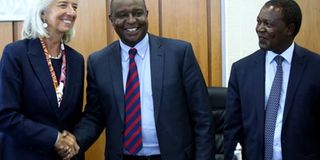IMF meets to discuss Kenya’s loan request to cushion against shocks

International Monetary Fund MD Christine Lagarde (left) with Finance Secretary Henry Rotich (centre) and CBK Governor Njuguna Ndung’u at Treasury Building in Nairobi during a past meeting. The International Monetary Fund lowered its 2015 global economic growth forecast on Thursday. FILE PHOTO |
What you need to know:
- With a hole in the budget and a depreciating shilling a Plan B is necessary
- Government says economy is subject to external factors due to country’s increasing integration in the global markets
- Kenya is already staring at a budget deficit this financial year
The board of the International Monetary Fund (IMF) will meet tomorrow to review Kenya’s request for a Sh68 billion ($750 million) loan to cushion the economy against external shocks.
This is in response to a request by the Kenyan government to the lender about three weeks ago to extend the loan as a precautionary measure against likely macro-economic instability and external shocks that have seen the shilling weaken against the US dollar.
Treasury Secretary Henry Rotich earlier told the Sunday Nation that this is a precautionary facility meant to safeguard the economy against possible external shocks.
“It is a sort of insurance package in case we have a crisis that requires funding,” he said.
In the second half of 2011, a rising import bill against low export revenues put immense pressure on the current account deficit, causing macro-economic shocks in the country.
The cost of living, measured by inflation, rose from a single-digit figure to 18.72 per cent in November, 2011.
During the same period, the shilling weakened against the dollar to reach an historic 107 units against the greenback.
Mr Rotich and Central Bank of Kenya (CBK) Governor Njuguna Ndung’u wrote to IMF managing director Christine Lagarde, saying that Kenya’s economy was susceptible to external factors due to the country’s increasing integration in the global markets.
“Our economy remains vulnerable to exogenous shocks. Kenya’s growing financial integration in global markets, while creating new financing opportunities, has increased vulnerabilities to shifts in investors’ risk perception,” the two said.
They also cited insecurity incidents largely arising from terrorism that have affected Kenya’s tourism sector and the business environment.
BUDGET DEFICIT
Kenya is already staring at a budget deficit this financial year but may raise as much as Sh270 billion ($3 billion) in the 2015/2016 financial year in the international market.
Last year, Kenya borrowed $2.75 billion in international markets to meet growing expenditure on ambitious roads and energy infrastructure projects.
BUDGET NEEDS
But, following the rebasing of the economy upwards by at least 20 per cent last year, the National Assembly raised the government’s debt ceiling from Sh1.2 trillion to Sh2.5 trillion allowing it to borrow more to meet its budgetary needs.
While analysts have in the past cautioned against excessive government borrowing, especially in the absence of a clear revenue generation plan, the government in its 2014/15 financial year fiscal framework is optimistic of a sustained stable macroeconomic environment and will be keen on “containing non-priority and unproductive expenditures”.
Although inflation has come under control and is now within the government target of 5 per cent with an upper limit of 2.5 per cent, the shilling has exhibited some weakness since last year due to a decline in forex earnings from tourism and tea.
The shilling is expected to weaken further this year despite the drastic decline in the international price of crude oil.
Analysts reckon the local currency remains vulnerable to dwindling export earnings following the decline in tea and tourism earnings. Tea, Kenya’s largest foreign currency earner, has been affected by low international prices.
Tourism, another leading foreign exchange earner for the country, is still in the woods because of insecurity.
The analysts further reckon the country is not attracting sufficient foreign direct investment, a situation aggravated by the imposition of the capital gains tax on net gains in sale of property, marketable securities and mining rights.
“Given Kenya’s rising external debt obligations, we need to see an enhanced export performance to mitigate debt service risks. In our view, risks remain, and the authorities are correct to adopt a relatively cautious approach to monetary policy,” says Razia Khan, Standard Chartered Bank’s head, global research.
The shilling has already declined by 1 per cent this year and is expected to struggle for the rest of 2015. It is currently trading at 91.5 units against the dollar.





